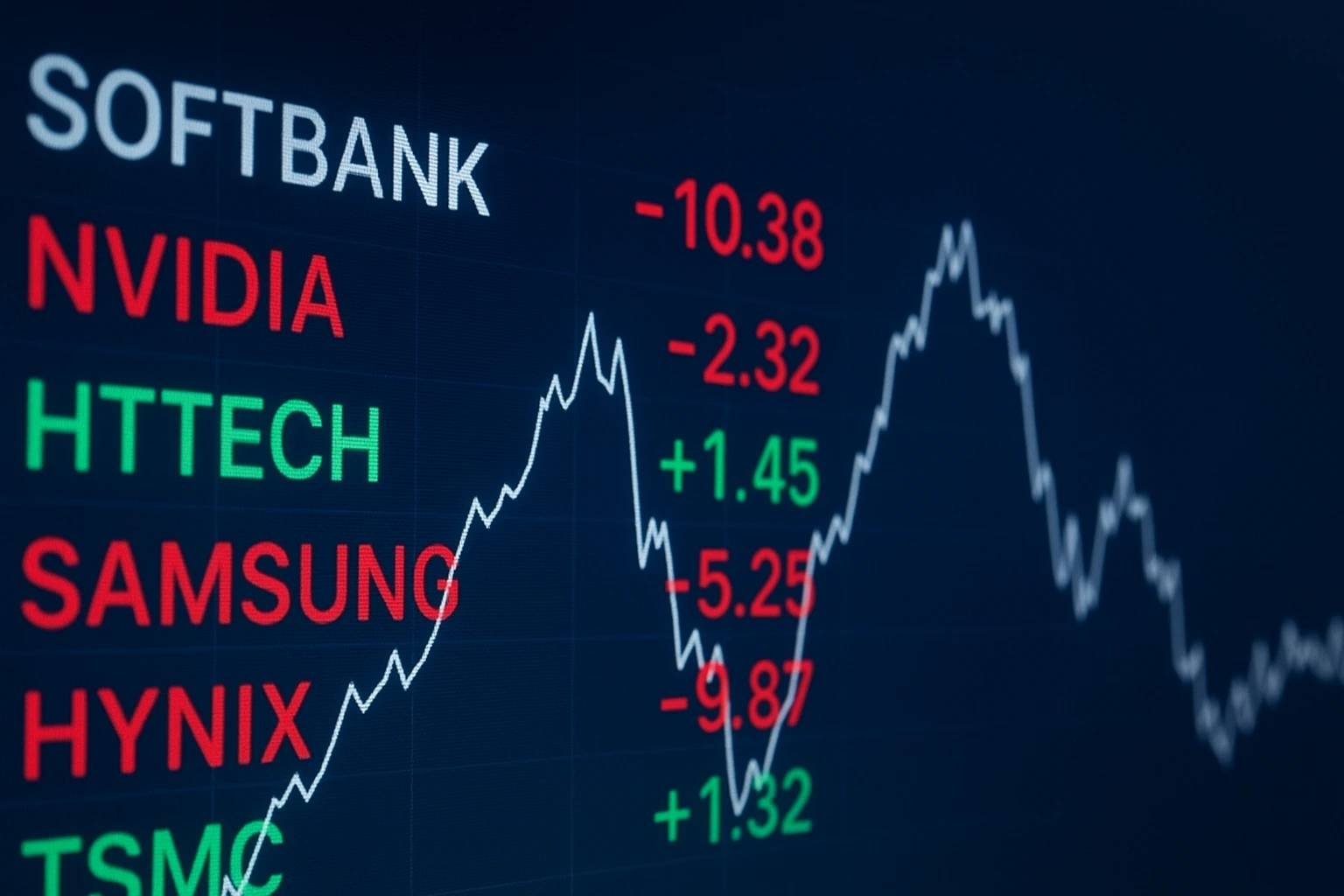Asian chip shares tumbled Friday in a broad market pullback triggered by Nvidia’s overnight slump, shaking investor confidence despite the US chipmaker’s stronger than expected earnings and optimistic guidance.
SoftBank, a key player in global semiconductor and AI investments, led the downturn with a double digit fall that rattled Tokyo markets.
The selloff unfolded hours after Nvidia dipped more than 3 percent in New York. The drop came even though the company exceeded Wall Street estimates in its third quarter results and projected robust fourth quarter sales.
The decline surprised analysts who had expected Nvidia’s earnings beat to lift semiconductor sentiment globally. SoftBank sank more than 10 percent in Tokyo.
The Japanese conglomerate had offloaded its Nvidia stake earlier this year yet remains deeply tied to the sector through its majority ownership of Arm, the British company whose chip architecture underpins Nvidia’s designs.
SoftBank is also involved in large scale AI infrastructure projects that use Nvidia’s hardware, including the multibillion dollar Stargate data center initiative in the United States.
Other major Asian chip shares were dragged lower amid concerns of momentum loss in the global AI rally. SK Hynix fell nearly 10 percent while Samsung Electronics dropped more than 5 percent. Both companies supply high bandwidth memory crucial to Nvidia’s AI chips.
Market analysts said the downturn highlighted how sensitive semiconductor stocks remain to signs of broader tech weakness, even when fundamentals remain solid.
“Investors reacted to a mix of macro pressure and sector fatigue, not Nvidia’s actual performance,” said Daniel Komura, a semiconductor analyst at Mizuhara Capital in Tokyo. The market has been overextended and Asian chip shares were vulnerable to a pullback.
Billy Toh, regional head of retail research at CGS International Securities Singapore, told CNBC that Nvidia appeared to be caught in several crosswinds, including a sharp Bitcoin retreat and growing uncertainty around US interest rate cuts. He said talk of an AI bubble intensified risk off sentiment.
“Add in the ongoing talk of an AI bubble, which triggers a broader risk-off rotation, and naturally Nvidia becomes one of the first pressure points,” Toh said.
Analysts noted that even companies not directly tied to Nvidia’s earnings felt the pressure. Taiwan Semiconductor Manufacturing Company, which manufactures Nvidia’s advanced chip designs, fell more than 4 percent in Taipei. Hon Hai Precision Industry, widely known as Foxconn, dipped 4.86 percent.
“This is the kind of synchronized reaction you see when sentiment drives the market more than fundamentals,” said Eun Jae Park, a Seoul based strategist at Hanrim Investments. AI demand remains strong, but markets are recalibrating.
The Friday retreat mirrored earlier selloffs this year when global chipmakers moved in tandem following shifts in US market expectations.
- • SoftBank: down more than 10 percent
- • SK Hynix: down nearly 10 percent
- • Samsung Electronics: down over 5 percent
- • TSMC: down over 4 percent
- • Foxconn: down 4.86 percent
- • Renesas Electronics: down 3 percent
- • Tokyo Electron: down 6.6 percent
- • Lasertec: down 5.2 percent
The declines underscore the scale of exposure Asian chip shares have to Nvidia’s performance. Nvidia is the world’s most influential AI chip supplier, and Asian firms remain deeply integrated in its production chain through memory chips, foundry services, components and advanced manufacturing equipment.
“Any shift in Nvidia’s market trajectory has an outsized impact on semiconductor stocks worldwide,” said Hideo Sakamoto, an economist at Kyushu Research Institute. “It is a linchpin for AI related demand and that affects everything from memory suppliers to equipment makers.”
The selloff rippled through trading floors in Tokyo, Taipei and Seoul, where retail traders expressed frustration over the sudden downturn.
“I woke up expecting a positive day because Nvidia beat expectations, but everything was red,” said Rika Matsumoto, a retail investor in Shibuya who holds several semiconductor stocks. “It feels like markets want an excuse to sell.”
In Seoul, traders reported heightened nervousness as retail investors attempted to exit positions quickly.
“People panicked the moment SK Hynix crossed below key support levels,” said Cho Min Hee, a brokerage employee near Gangnam Station. “AI stocks have been the most popular this year, so a hit to sentiment is painful.”
A chip manufacturing engineer in Hsinchu, Taiwan, said the swings do not reflect the industry’s real workload.
“Our production lines are still maxed out,” said the engineer, who requested anonymity due to workplace restrictions. “From a factory perspective, nothing has slowed.”
Despite the retreat, analysts said they expect the downturn in Asian chip shares to be temporary. Nvidia’s bullish guidance, along with long term demand for AI servers and memory, continues to support the sector’s outlook.
“Institutional investors will likely reenter once the market stabilizes,” Komura said. “The fundamentals of AI chip demand are still intact.”
Others cautioned that volatility could persist as global markets weigh the likelihood of delayed US rate cuts.
“If financial conditions remain tight, tech stocks could stay under pressure,” said Park. “It doesn’t change the structural growth story, but it may limit short term upside.”
Some analysts noted that stronger than expected fourth quarter results from Nvidia could quickly reverse sentiment.
“Earnings season could be a turning point,” Sakamoto said. “A solid finish to the year would reassure markets that growth is not slowing.”
Friday’s steep selloff underscored the global influence Nvidia holds over semiconductor sentiment, with Asian chip shares falling broadly despite the company’s strong earnings and upbeat guidance.
While analysts expect volatility to continue in the near term, many maintain that long-term demand for AI technologies will keep the sector on a growth trajectory. For now, regional markets are adjusting to renewed uncertainty after months of soaring optimism.
